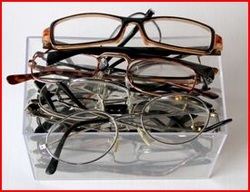
To Americans, “franchising” means golden arches and sandwiches named after public transportation. Many view these businesses as responsible for obesity, roadside trash, and ridiculous cartoon mascots.
But if you live in a developing country, franchising—and, more specifically, microfranchising—can mean the opportunity to own your own business and make an income to feed your family.
Just ask Rama Devi, who became a Vision Entrepreneur with Vision Spring, a microfranchise business that sells eyeglasses. In 2006, Ms. Devi had been a seamstress in India. But the $44 she earned each month wasn’t enough to support her husband and two children.
As a Vision Entrepreneur, Ms. Devi now makes over $100 per month. Seeing how lucrative the business could become, her husband quit his agriculture job and they became co-partners in the endeavor. Along with financial security, the couple says their marriage is better because of the cooperative work they do as a sales duo.
Vision Spring helps entrepreneurs improve their communities by making the gift of sight available to those who previously didn’t have access to eyeglasses. Entrepreneurs sell the glasses on consignment, and then reimburse Vision Spring. Additionally, Vision Entrepreneurs educate their communities about eye health and refer those with serious eye problems to clinics.
Last month’s Entrepreneur Magazine has a nice article about Vision Spring and its founder, Jordan Kassalow.
Microfinance is a hot topic because it’s an out-of-the-box approach to combating poverty that works. Microfranchising just may be version 2.0, because it goes one step further.
Not only does microfranchising make owning a small business financially possible for those in developing countries, it gives the entrepreneur a business model, training, and materials. Vision Spring calls it “business in a bag.” I call it “opportunity in a bag.”
Vision Spring’s reach goes one additional step beyond any ordinary microfranchise. Because not only does it improve the entrepreneur’s life, it improves their community, too. The ability to see allows someone to work and become an engaged, productive member of their society.
BYU’s Economic Self-reliance Center is researching microfranchising, evaluating and streamlining its theories, and anticipating and heading off problems. According to their mission statement, they, “intend to be the leader in the emerging field of microfranchising and develop an arena for those who are either currently working or desire to participate in microfranchising to operate.”
Jason S. Fairbourne, director of BYU’s MicroFranchise Development Initiative, was first author onMicroFranchising: Creating Wealth at the Bottom of the Pyramid.
In it, he writes, “We live in a unique period of time in which people living in developed nations … are experiencing a standard of living that was unfathomable half a century ago. Simultaneously, many more are suffering from the tribulations of poverty.”
Perhaps, with basic economic education, microcredit, and the implementation of microfranchises, the next half-century can improve the standard of living for more people.


 RSS Feed
RSS Feed

